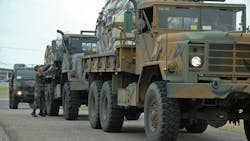With Memorial Day being celebrated this week—a time for remembering the brave men and women who died while serving in the country's armed forces—I thought it appropriate to consider some of the lessons we can learn from how the military handles its logistics.
In “Five Lessons from Military Logistics,” Joe Lynch discussed the history and importance of military logisticians and how businesses can benefit from their years of experience.
The lessons to consider are:
1. Core Values/Culture—In the military the core values of loyalty, duty, respect, selfless service, honor, integrity, courage and teamwork are key and are applicable in the business world (although, unfortunately not always followed!).
2. Mission—In the military, it is critical for everyone to understand the mission, as it can actually be a question of life or death. In business, while an organization might have a mission statement with some strategies for sales and marketing, the supply chain and logistics processes might not be totally aligned with it or at least have a clear understanding of it. They also need the proper guidance, tools and training to support the mission.
3. Process—“The military has developed processes and standards that enable them to be timely, responsive, adaptable and precise. They have processes for planning, ordering, package design, loading, stacking, unloading, product placement, security and safety.” Do we always have the same in business? That is where philosophies like Lean thinking can standardize and improve your processes to reduce costs, improve efficiency and ultimately the bottom line.
4. Documentation—Military “cargo must be labeled correctly, locations which are often changing need to be precise, and drivers need to understand what they are hauling and when it needs to be there.” The same goes for business logistics in order to deliver on the promise of having the right product, at the right place, at the right time.
5. Communication Technology—The military is a heavy user of technology to keep the supplies and equipment moving; in fact it was the first to heavily use RFID. The increased availability and affordability of tools such as ERP, GPS, the Internet, etc., have enabled even small businesses to stay connected with their customers and suppliers worldwide. I believe that technology is a key enabler of a Lean supply chain.
As Joe says (and I couldn’t say it any better), Memorial Day is a time to give a “special thanks to the military veterans for their sacrifice and their contributions to the field of logistics.”
About the Author
Paul Myerson
instructor, Management and Decision Sciences
Paul Myerson is an instructor, Management and Decision Sciences at Monmouth University. He is the author of four books in the field of supply chain and logistics management, a developer of a Windows-based supply chain planning software (www.psiplanner.com), and co-author of a lean supply chain and logistics management simulation training game by ENNA (www.enna.com).
